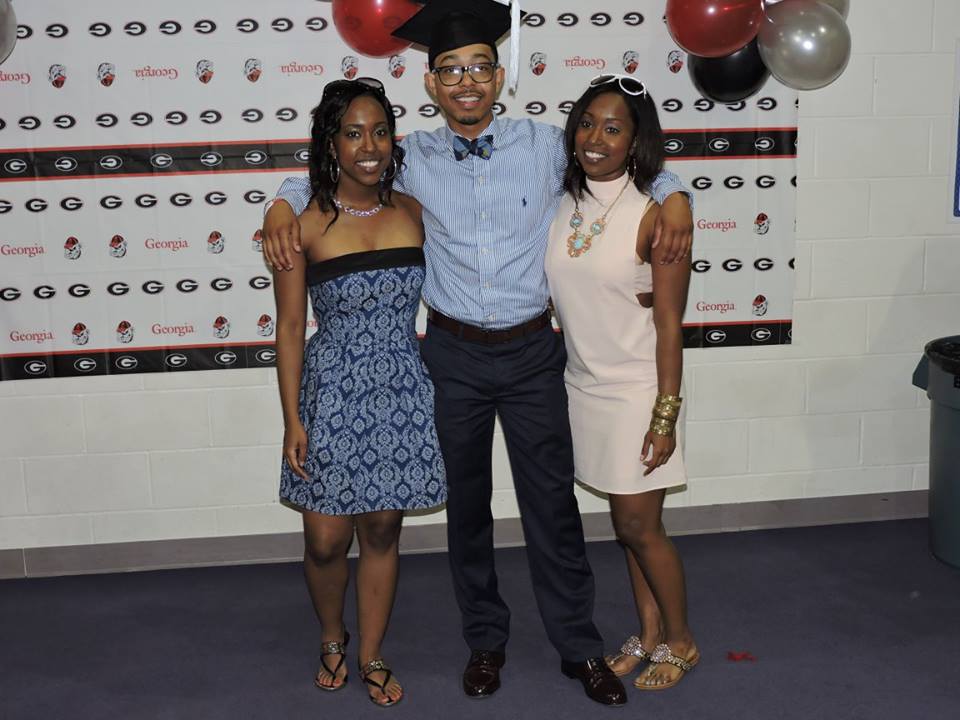Clarke Central High School graduates (left to right) Lateefah Gresham, Fakari Gresham and Latima Gresham pose in their graduation robes. Lateefah is a graduate from University North Carolina Chapel Hill, Fakari is a graduate from University of Georgia and Latima is a graduate from Emory and Duquesne University. “Applying for college required a lot of work. It was a stressful and kind of intimidating, yet very fulfilling process. I was constantly in the counseling office seeking advice, applying for scholarships, reviewing essays, etc,” Latima said. Photo courtesy of Lateefah Gresham.
By HANNAH GALE – Writing Coach
First-generation college students are students whose parents did not attend college. Though they do face barriers that others may not face, some students continue to persevere with support from their family, school and community.
There are 1,463 students who walk the halls of Clarke Central High School. According to college adviser Darnell Shelton, over half of those students have parents who never attended college.
“First-generation students have more barriers in place that other students who have had family members specifically go through college because they know what to expect and are familiar with how to fill out an application form, how to apply for financial aid, ” counselor Heidi Nibbelink said. “That can just be a whole new overwhelming world for a first-generation student because their parents can’t help them at all because they don’t know it, they haven’t been through it.”
Some students face emotional barriers that can make the application process more challenging than necessary. These barriers can cause a student to lose their motivation in school which can make the steps leading up to college applications more tedious.
“Applying for college required a lot of work. It was a stressful and kind of intimidating, yet (a) very fulfilling process,” 2007 CCHS, 2011 Emory University and 2013 Duquesne University graduate Latima Gresham said. “I was constantly in the counseling office seeking advice, applying for scholarships, reviewing essays, etc.”
When 2007 CCHS and 2011 University North Carolina Chapel Hill graduate Lateefah Gresham attended college, students whose parents attended college seemed to have more stable and accessible network already, while she needed to establish those connections independently.
“My classmates with ‘educated’ parents only seemed to thrive more than me through their parents’ connections. I didn’t have internships and jobs in place for me in case I failed during my interviews. I had to create those opportunities for myself,” Lateefah said. “It didn’t seem fair that I had to work so much harder to establish myself, but this world is all about connections. Knowing that I completed college by myself, being guided by my faith and my parents who never even attended (college), made my accomplishment of finishing that much sweeter.”
With the lack of guidance some first-generation students might face when applying to college, students may need to broaden their horizons and seek guidance from others who are available, which may be counselors, teachers, college advisers and other members of their community.
“The (college) application process taught me how to initiate. I had to step out of my shell and ask those around me who had attended college for help,” Lateefah said. “It was frustrating because I didn’t know all of the questions to ask, so I would have to go back to the people multiple times. Luckily, my mentors didn’t mind multiple questions and gave me a lot of helpful tips.”
Applying for college is a stressful time for everyone, but for a first-generation student, it involves stepping out of their comfort zone and doing something that is considered outside the norm in one’s family, like attending college.
The Gresham family poses at Fakari’s graduation party from the University of Georgia. Fakari is a CCHS alumni along with his sisters, Latima and Lateefah. “The (college application) process for me was pretty straightforward because I had two twin sisters who were graduating college upon me entering college, so that definitely made it an easygoing transition,” Fakari said. Photo provided by the Gresham family.
“I think all students face that feeling of being overwhelmed by the whole application process whether they’re a first-generation student or not,” Nibbelink said. “I think part of it is just seeing yourself as a college student or seeing yourself as a college graduate can be a little scary to do something different than your family members have done. A lot of people end up doing something similar to what their family have done. It’s kind of rare to break out of the mold so I think just that vision of yourself as doing something different, and it’s okay to do something different and to have this strange, to go all the way through it.”
During the 2014-2015 school year, CCHS was provided with a college adviser by the College Advising Corps, Darnell Shelton, to specifically assist first-generation students establish a path for the future.
“(Applying for college can be) tedious. If you don’t come from that background, or if your mom or dad’s not educated, or have a (Bachelor of the Arts) or (Bachelor of Science), it’s going to be difficult to do it yourself. I try and simplify that process for them,” Darnell Shelton said.
First-generation students such as 2011 CCHS and 2015 University of Georgia graduate Fakari Gresham, Latima and Lateefah had parents that continuously gave them moral support which encouraged them to work harder with academics. They received support from their counselors, teachers and parents at a young age which provided them the motivation to accomplish their long-term goal of attending college.
“It was kind of mind-boggling, knowing that my parents did not go to college because there was always this thought in the back of my mind like, ‘Well, my parents didn’t attend college, so do I have to?’ and my parents aren’t the richest, but they’re not poor either and with me and my family living a ‘comfortable’ life left me with skepticism,” Fakari said. “My parents did not want me to settle for mediocrity so it almost felt as if my parents were college graduates simply through their moral support.”
Latima, Lateefah and Fakari Gresham pose with their mother and father. Though their mother and father did not attend college, they constantly supported Latima, Lateefah and Fakari through their college experience. ” At the end of the day, I had parents who were in full support of every decision I made during college, although they never directly attended a college or university,” Fakari said. Photo provided by the Gresham family.
Shelton organizes events such as Apply to College Week and the College Fair at CCHS to try and help students find the best-fit university for them. Shelton also sets up college campus tours and one-on-one meetings with their counselors to make sure students are on the right track to succeed.
“Because my sister and I were applying to college at the same time, we kept each other on track when it came solidifying a list of schools, meeting deadlines and applying for scholarships. My parents did not know much about completing the application process, but they networked and found people that were able to help us,” Latima said.
According to Nibbelink, some parents of first-generation students stress to their children that their children will be going to college and the parents do all they can do to set their children up to succeed.
“I see so many parents of first-generation students who are like ‘You are going to college,’ and that’s the role that they can play. Encouraging and saying ‘this didn’t happen for me, I want to make sure it happens for you,’ and then helping their kids hook into resources that can give that expertise that they don’t have as parents,” Nibbelink said.
Shelton says he always tells his first-generation students that ‘no matter how you start, it’s really how you finish,’ because it helps him to convey the idea that students that they need to believe in and apply themselves for the future.
“My parents may have pressured me to work harder and go to college since they were not afforded the opportunity, but I don’t feel like my experience differed much from that of my peers,” Latima said. “My parents were limited in the personal help they could provide when applying to school, but I always felt that my parents were just as dependable, loving, and knowledgeable as any other college-educated parent.”
Though some students have parents that did not attend college, the Greshams’ parents still made an income above the poverty level and had the resources and support needed for their children to further their education.
“I was never embarrassed that my parents didn’t attend college. College is not for everyone. My mother is an entrepreneur, and my father works for a great company and earns a nice salary for someone without a degree,” Lateefah said. “I never went without anything growing up, so it didn’t matter that my parents didn’t attend college because we still live like the “middle class” people around us, so I didn’t think that I was different. If anything, it proved to me that degrees are not necessary to achieve your goals and raise a family, it’s all about your ambition.”


